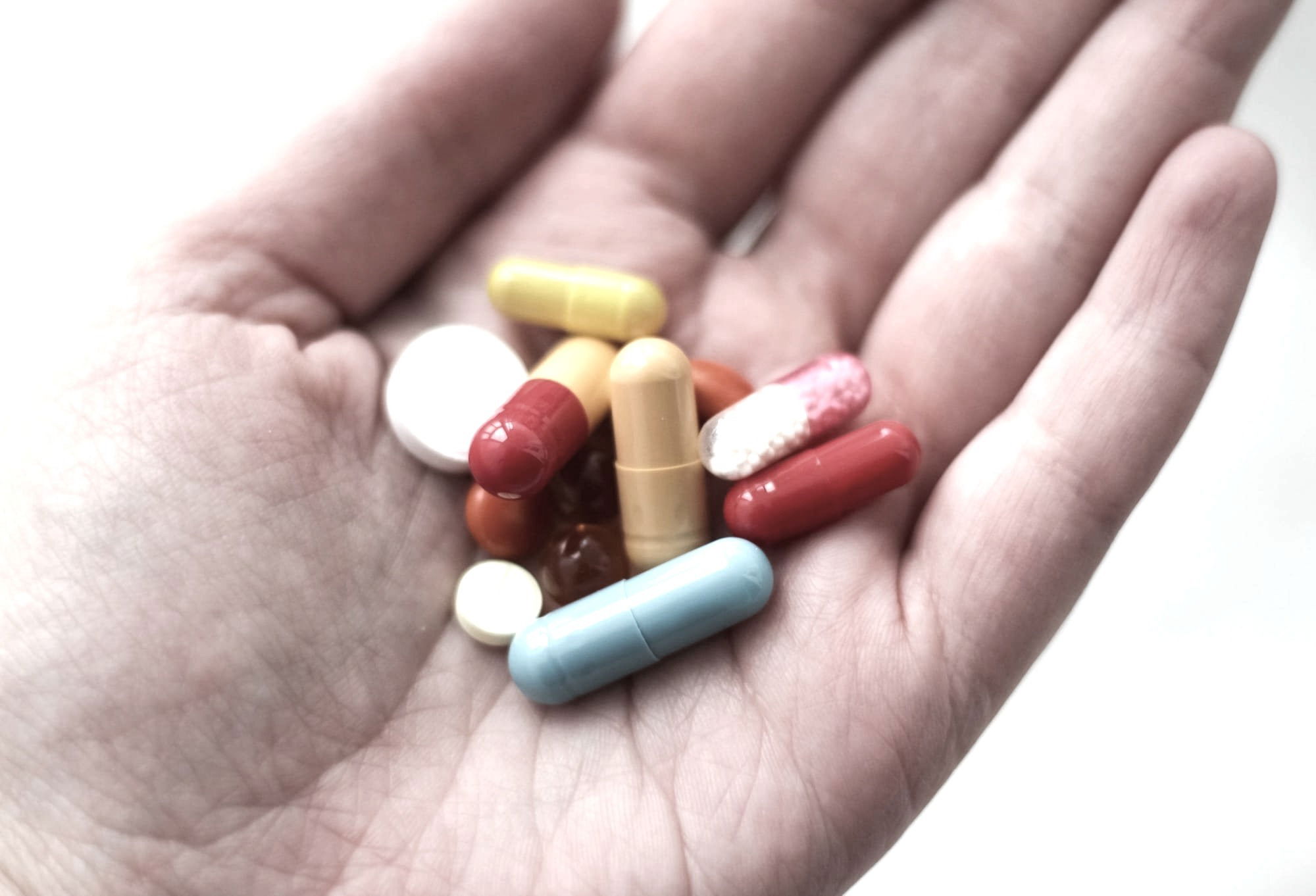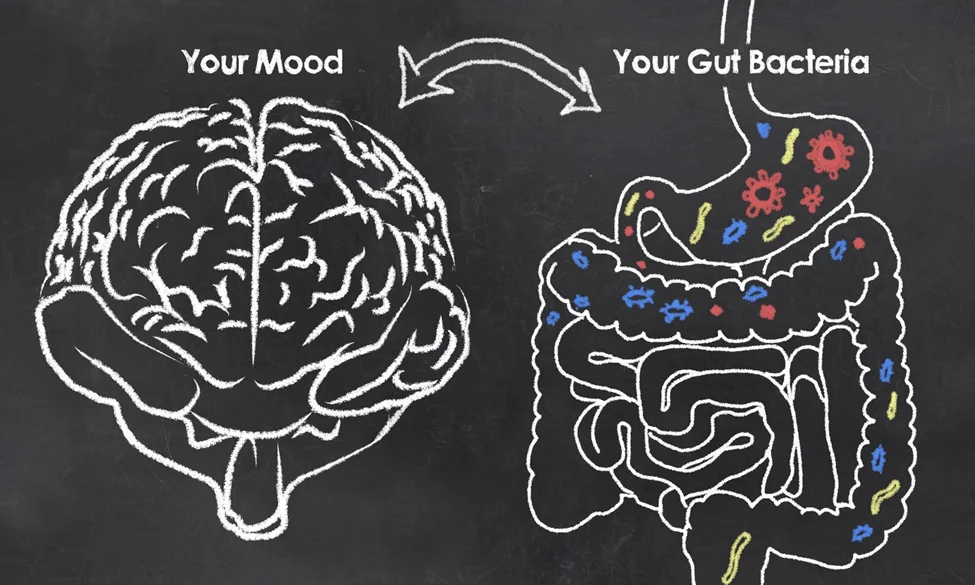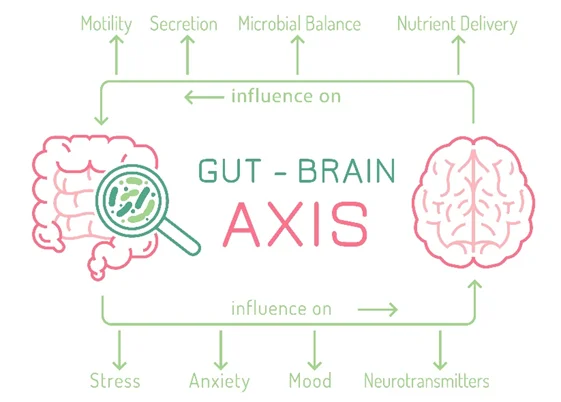GUT HEALTH AND ANXIETY


Anxiety disorders are the most common mental health conditions in America, affecting 40 million U.S. adults. Currently, the standard treatments for these conditions are psychotherapy (aka “talk therapy") and medications. Experts are eager to learn more about the gut-anxiety connection in order to find better treatments for anxiety disorders, since standard treatments are effective for many people but not for all. According to the National Alliance on Mental Health (NAMI), anxiety disorders are the most common mental health concern in the United States. At the same time, digestive diseases account for over 100 million health care visits annually.

While there is growing interest the gut-anxiety relationship, the research is still in its early stages. However, scientists have determined there is a key connection.
The gut or gastrointestinal system (GI) is a series of organs, nerves, hormones, and bacteria that work together for food digestion. The brain is directly connected to the GI by the central nervous system (CNS), and signals flow between the two to control some aspects of digestion.
Stomach problems are one of the most common symptoms of stress and anxiety. Researchers have identified a connection between the gut and the brain. Like the brain, your gut is full of nerves called the enteric nervous system, or ENS, also referred to as the “second brain”. The enteric nervous system has the same type of neurons and neurotransmitters found in your central nervous system.
This connection between the brain and gut affects your digestion, mood, and the way you think. ENS lines your entire digestive system with more than 100 million nerve cells forming two layers. It runs from the esophagus to the rectum.
Scientists believe it may play a role in the relationship between the gut and a person’s state of mental health.
According to recent research on the gut-brain relationship, the ENS and brain communicate to control gastrointestinal processes, linking cognitive and emotional function centers in the brain with GI mechanisms. Researchers suggest this communication system may affect motivation and higher cognitive function.
Experts believe the ENS may also trigger big emotional shifts in people experiencing Irritable Bowel Syndrome (IBS) and other digestive disorders. Irritation in the GI may send signals to the CNS that trigger mood changes.
Researchers believe that regulating the gut microbiome — the good (and bad) bacteria and other microorganisms in your gut — may ease anxiety.
How to Improve Gut Health and Ease Anxiety
So, what does this mean for you if you have an anxiety disorder? Experts have pinpointed lifestyle changes you can make now to improve the health of your gut and manage your anxiety.
Make Fiber a Staple in Your Diet
An accessible and affordable way to positively influence your gut microbiota is to increase the amount of fiber in your diet, ideally from a wide variety of plant sources. Currently, experts recommend that adults eat 14 grams of fiber for every 1,000 calories they consume each day. Some high-fiber foods you could add to your diet:
- Fruits, including pears, strawberries, avocados, apples, raspberries, and bananas
- Vegetables, such as carrots, beets, broccoli, artichokes, and Brussels sprouts
- Legumes, like kidney beans, split peas, and chickpeas
- Vitamin D, Vitamin D regulates your microbiome and reduces gastrointestinal inflammation. Some foods that have vitamin D include egg yolks, tuna, salmon, orange juice, and fortified milk.
- Protein Proteins contain nitrogen, which limits the number of bad bacteria in a microbiome. Eating protein may decrease feelings of depression because of the production of serotonin, which improves your mood. Good sources of proteins include eggs, milk, yogurt, lean beef, turkey, chicken, fish, broccoli, oats, and nuts.
- Omega-3s. Omega-3 fatty acids help lower cholesterol, increase memory and cognitive function, and reduce sugar cravings. Walnuts, flax seeds, salmon, sardines, and mackerel are all rich in Omega-3s.
Add Aerobic Excersice to Your Daily Routine
Exercise offers a plethora of well-documented health benefits, including better gut health. According to a review published in April 2019 in Exercise and Sport Sciences Reviews, exercise can alter the composition of bacteria and other microorganisms in the gut, which could in turn could foster mental well-being.
Set Aside Time for Mindfulness Every Day
Mindfulness — a type of meditation that involves sitting quietly with your eyes closed and observing the thoughts and images that float through your mind without judgment — can be helpful for managing both anxiety and gut issues.There's a lot of really good research on mindfulness-based stress reduction that has been used in the context of irritable bowel syndrome [a gut disorder] and post-traumatic stress disorder, or PTSD .
Effectively digest your food After a meal, it’s important to be in a relaxed state to produce the gastric juices needed to absorb food. Gastric juice is essential for the absorption of vitamins, minerals, and nutrients necessary to support a healthy body and brain.
Mind what and how you eat Eat healthy snacks and meals and stay away from junk food. One way to do this is to prepare pre-planned meals, have some fruits or a granola bar to snack on when hungry. Also, take time when you eat to fully savor the food, enjoying every bite.
Drink plenty of water Aim to drink between six and eight glasses of water a day to boost the digestive process.
Seek help A therapist who specializes in anxiety can help you manage chronic worrying. Food for Your Mental Health The key to improving your gut health is to know the types of foods that boost your gut health and mental health. Some of these foods include: Fiber. Eating fiber improves memory and overall mood. It also decreases inflammation and oxidative stress by supporting microbiota. Foods high in fiber include beans and legumes, oats, nuts, dark chocolate, fruits, and vegetables. Vitamin D. Vitamin D regulates your microbiome and reduces gastrointestinal inflammation. Some foods that have vitamin D include egg yolks, tuna, salmon, orange juice, and fortified milk.
Protein. Proteins contain nitrogen, which limits the number of bad bacteria in a microbiome. Eating protein may decrease feelings of depression because of the production of serotonin, which improves your mood. Good sources of proteins include eggs, milk, yogurt, lean beef, turkey, chicken, fish, broccoli, oats, and nuts.
Omega-3s. Omega-3 fatty acids help lower cholesterol, increase memory and cognitive function, and reduce sugar cravings. Walnuts, flax seeds, salmon, sardines, and mackerel are all rich in Omega-3s.